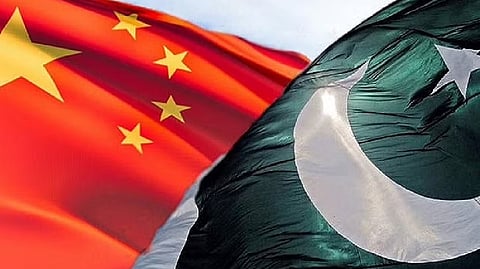

KARACHI: An agreement is reached between a Chinese company and Pakistan to run a new bus service in Karachi, local media reported. The bus service will be on the pattern of 'Peoples Bus Service'. The Chinese company, Shandong Hi Speed, during a meeting of a delegation of the Chinese company with Sindh Transport Minister Sharjeel Inaam Memon in Karachi reached an agreement.
Pakistan Minister Sharjeel Memon has asked the Chinese company to complete the process of procurement of buses, reported Pakistan's local media portal Radio Pakistan. Under this new bus service, there will be a fleet of five hundred buses, which will reach Karachi within four months.
An impoverished but friendly Pakistan has welcomed China, mainly through the multi-billion China Pakistan Economic Corridor (CPEC), allowing the latter's expansion and access into the Indian Ocean region. In reality, however, it has proved to be an expensive venture on several counts, not the least in terms of lives lost. Twenty-four Chinese nationals have died and many more injured in targeted attacks in the last year alone.
The April 26 terror attack in the heart of the University of Karachi indicates that militancy in Pakistan, of both religious and ethnic variety, while not sparing traditional adversaries - minorities and the state -- is increasingly getting a distinct anti-China edge, and it should worry self-touted "iron and all-weather friends". The target was not a CPEC project that attracts opposition from the locals, but Confucius Institute, China's cultural hub, one of the many set up worldwide. Begun in 2004 to impart free education in the Chinese language and culture, it has been rejected in many Western countries as a purveyor of propaganda.
Besides, many - unaccounted or kept secret - died during the making of the Gwadar port and naval base and other projects in the pre-CPEC era. The woman who carried out the 'suicide attack' was Shari Baloch. Her photograph with a smile and a 'V' for victory sign, was available on social media. She belonged to the Balochistan Liberation Army's Majeed Brigade that has claimed responsibility for the attack.
As Shari Baloch was a post-graduate and a teacher by training and profession it confirms that the militancy's face in Balochistan has radically changed. It is not from the impoverished tribal youths alone but also draws from the urban and educated classes of the province that feel exploited as a result of the CPEC. With CPEC, the governments of Nawaz Sharif and Imran Khan have battled unsuccessfully, unable to deal with coordinated surprise attacks, despite oppression by the state and hundreds of youths having 'disappeared', ending up dead or in jail indefinitely. Forming an elite division of the Army exclusively for CPEC's security has not helped.
The new government of Shehbaz Sharif has announced its resolve to address the militants, particularly those in Balochistan. But security in the provinces is managed by a mishmash of intelligence agencies, both civil and military, and there remain militants who are nursed as 'assets', to be played one against the others, till they turn rogue. Thus, it has a tough task on hand.
Visit news.dtnext.in to explore our interactive epaper!
Download the DT Next app for more exciting features!
Click here for iOS
Click here for Android